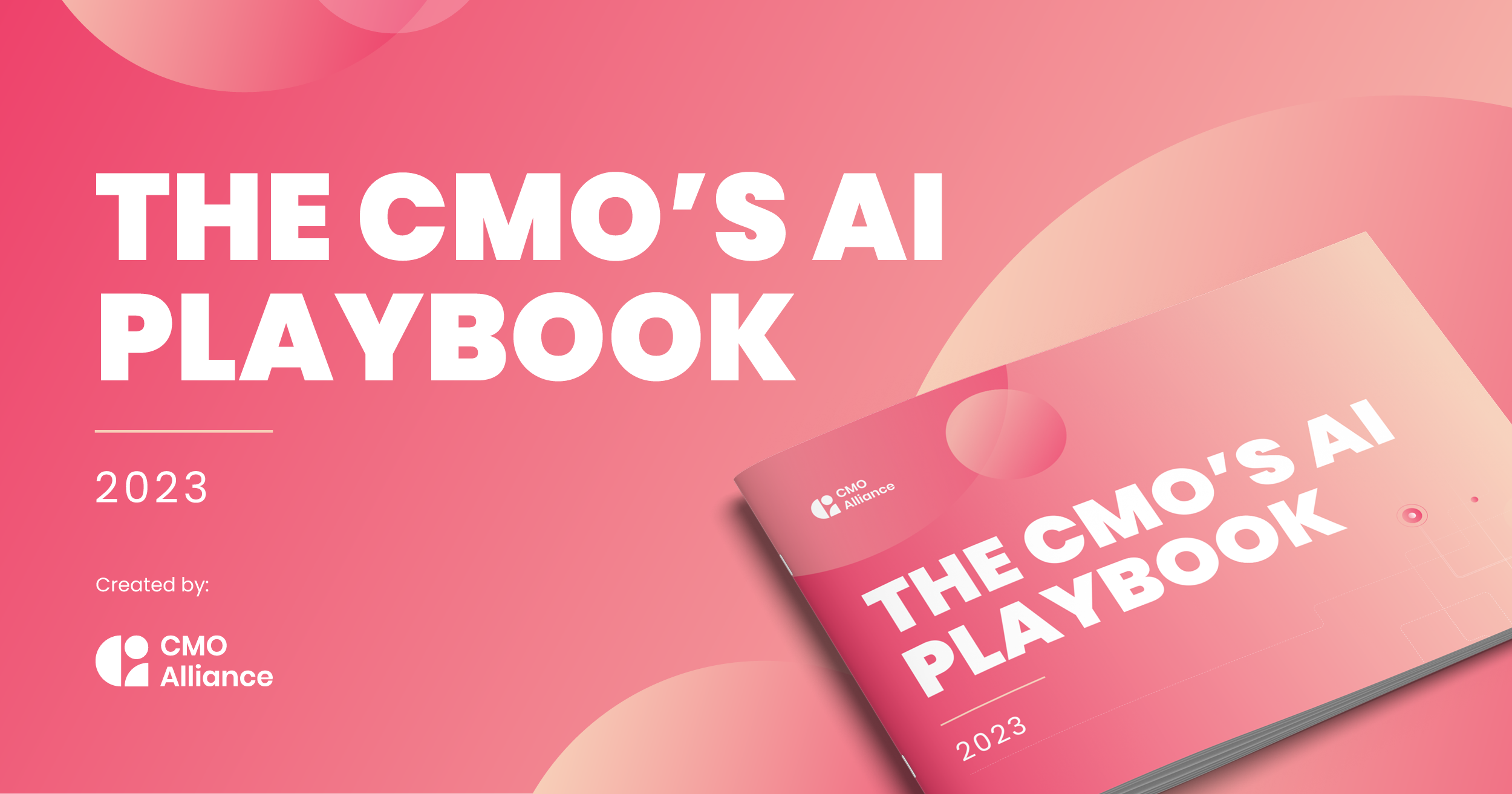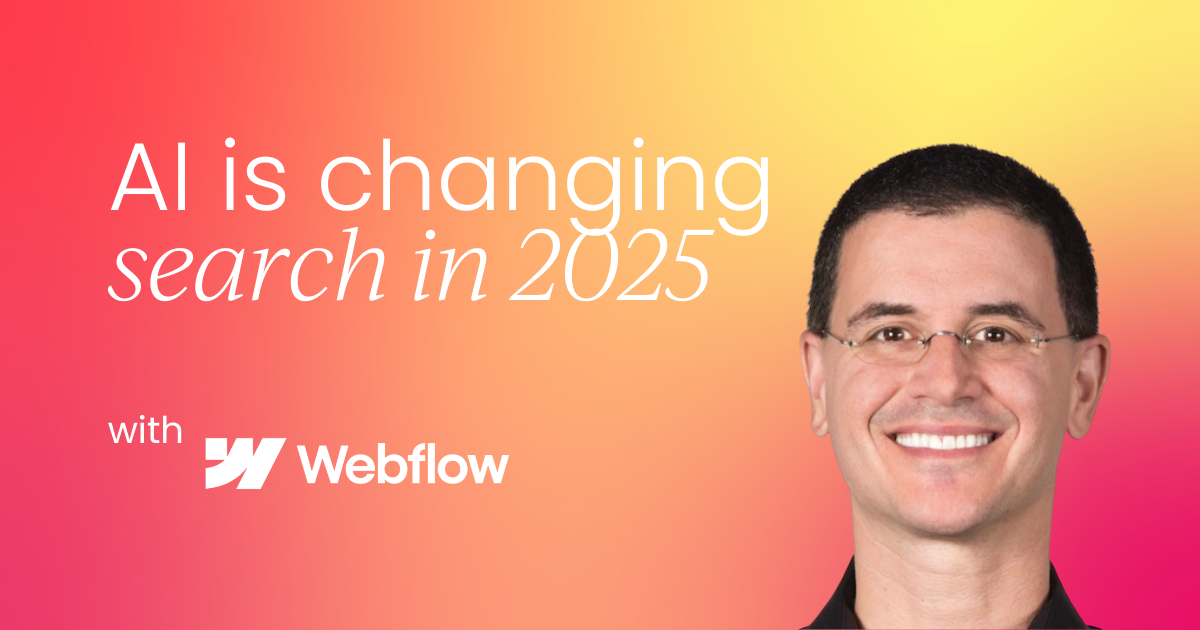In marketing, the intersection of human insight and artificial intelligence is a pivotal discussion point. As AI continues to evolve, business leaders grapple with its potential and the ethical considerations it brings.
But, the heart of successful business remains human-centric. Successful organizations are driven by our innate ability to adapt, innovate, and build genuine relationships. Central to this is striking the right balance technology and the human element. While AI holds transformative promise, I believe the heart of marketing still lies in the people, their ideas, and their strategic thinking.
Tools can only do so much; it's the human touch that crafts a brand's story and message.
Prefer to listen? Check out Jason's appearance on the CMO Convo podcast 👇
The impact of AI on the marketing industry
The current landscape of AI in marketing feels very reminiscent of the "wild west." When considering technology, it's essential to address three primary pillars: people, process, and the tech itself. Ensuring that the technology aligns with meaningful use cases for your business is crucial. Otherwise, what's the purpose of its integration?
In the current climate, marketers are navigating a maze when it comes to AI. We're all trying to identify substantial use cases that can genuinely enhance business value. There's significant risk in falling behind, becoming obsolete in a rapidly evolving industry.
Peering into the future and the repercussions of AI on the industry can be challenging. Especially with generative AI, there are inherent pitfalls. Models can have "prompt drift," meaning the output might vary depending on various factors. Such a probabilistic nature demands human oversight to ensure optimization and to rectify any aberrations, like the AI "hallucinating" answers.
Another critical aspect is the safeguarding of intellectual property. Businesses must remain vigilant about data storage, and how copyrights and IP are protected.
Particularly in B2B tech, marketers seem to be hopping on the AI bandwagon, propelled by the immense noise surrounding it. Yet, the gains are undeniable. Whether it's increased productivity, creative strides, or data processing capabilities, AI offers marketers tools that were previously unimaginable.
But amid all these advancements, it's pivotal to remain grounded. Determining the tangible business value AI brings and not getting swept away by the noise is vital.
We're in an era where AI's impact feels overwhelming and swift, with businesses constantly adapting. However, as with any technological advancement, the market will normalize. Businesses will evolve, some folding these innovations into their products, while others might struggle to keep pace. Despite the current frenzy, I believe that AI's integration into marketing is a positive and necessary evolution.
Human oversight is critical to AI content creation
When you delve into the trifecta of people, process, and technology, the landscape becomes more intricate. On the technological front, the primary appeal of AI lies in its ability to operate at a vast scale. While AI might automate certain facets, its output often lacks the authentic touch that humans bring.
This realization brings us to the "human in the loop" concept, emphasizing the irreplaceable role humans play, especially in content creation. Whether it's refining content to align with brand values or ensuring it resonates with the target audience, the human perspective remains crucial.
Even in the realm of creative endeavors, while AI might generate outputs, the judgment and discernment of whether it mirrors the business's ethos are undeniably human.
Then, when we talk about the process, AI can certainly help create content. For instance, it can draft structures for a blog post, suggesting a flow and approach. But, it only ventures into segments of the process, leaving significant aspects necessitating the human touch.
A common misconception was that the introduction of AI would spell doom for roles like copywriting. Though AI can churn out vast amounts of content, it often lacks quality and relevance. While such voluminous output might suit specific purposes like SEO, it misses the mark in offering genuine value. What consumers truly seek is the value a business can bring to them, articulated in an authentic manner.
Focusing on content, the essence remains the same across various AI applications. Human oversight and intervention are imperative, at least in the present scenario. Though the future remains uncertain, for now, AI needs the human touch to ensure its outputs are meaningful and resonant.
AI won't replace content creators and marketers
In our current, rapidly evolving technological age, organizations are enthusiastically exploring the possibilities of AI. From a product-centric standpoint, while models can be built and trained to function autonomously, they invariably require human intervention. Ensuring the model's accuracy, relevance, and constant refinement based on emerging information is paramount, and currently, this is a task that humans are best suited for.
The rise of ML OPS (Machine Learning Operations) underscores this necessity. According to Gartner, the astounding statistic that around 80% of ML and AI projects never transition into production reveals a gap. They may lack meaningful business value, operational feasibility, or perhaps the human oversight to ensure their effectiveness.
When it comes to content creation, there's a spectrum of stakes. On one end, we have high-stakes content, like marketing material that is outward-facing and carries the brand's voice. Here, the content must be impeccable.
On the opposite end is low-stakes content, like customer service interactions, where the primary goal is to comprehend the essence, rather than having perfect grammar or phrasing. A distinction that, when understood, allows businesses to tailor their AI applications more judiciously.
However, suggesting a complete AI takeover in any of these processes would be premature. The symbiotic relationship between human and machine is here to stay, at least for the foreseeable future. Humans will always play a pivotal role in refining, guiding, and overseeing AI's outputs. The future may not see humans being replaced, but rather their roles being redefined in conjunction with AI.
The importance of training in the era of AI
Training has always been a pivotal aspect for any team, and in today's AI-driven world, its significance cannot be overstated. Before diving into AI-related training, it's essential that a marketing team is well-versed in core marketing concepts. Only after establishing this foundation can a team effectively integrate AI tools into their processes.
The term "training on AI" is broad and can mean various things depending on the specific tools and platforms a team employs. For instance, if a marketing team uses a specific marketing automation platform, it's crucial they receive training on the AI aspects of that platform. Every specialist or sub-team should be well-acquainted with how they can leverage AI to optimize their specific tasks.
During our regular team discussions, I've noticed that different members utilize generative AI in unique ways. It's enlightening, yet a tad unsettling, to observe the myriad of applications that arise spontaneously. Consequently, there's a need to establish certain guidelines and boundaries to ensure that AI usage remains purposeful and safe, particularly concerning sensitive company data.
Department-wide discussions around AI are vital. Regularly checking in on the team's experiences, the challenges they face, and the benefits they've garnered from AI tools can lead to more cohesive and efficient AI integration.
However, it's paramount that these tools don't become mere distractions. They should provide tangible value to the business. Hence, it's crucial to differentiate between genuinely productive tool usage and mere "play". In rapidly growing businesses like ours, time is of the essence, and every tool or strategy should be directed towards concrete objectives.
Training needs vary across disciplines. While more technical roles, such as those in operations, might require formalized AI training sessions, creative roles, like design, might demand a more fluid approach. The key takeaway is that there isn't a universal AI training module; the approach must be tailored to the team's unique needs and functions.
With everything changing so quickly, you must strike a balance between leveraging the latest tools and maintaining a solid foundation in traditional marketing principles.
While machine learning and other technological advancements have made remarkable strides, their real power is realized when they're used to amplify and execute time-tested marketing strategies.
Fundamentally, our goal as a marketing team is to propel our business forward, ensuring profitability and delivering genuine value to our customers. The dual-speed strategy we often discuss involves capturing existing market demand while simultaneously nurturing and creating demand that might not yet exist. This framework incorporates both short-term performance marketing and long-term brand planning.
Navigating the ethical landscape of AI in marketing
The ever-evolving domain of AI in marketing presents not just opportunities but also challenges, particularly when it comes to ethics and regulations. It's not just about harnessing the potential of AI to achieve business goals but ensuring that its utilization aligns with best practices, regulatory standards, and ethical considerations.
Being proactive is crucial. As marketing leaders, we're tasked with crafting guidelines that are not just suitable for our teams but resonate with the broader ethos of our businesses. It's about determining what's appropriate for our unique contexts, anticipating potential challenges, and designing frameworks that ensure AI is utilized in a responsible and ethical manner.
However, it's essential to understand that this isn't solely a marketing concern. AI's impact is widespread, permeating areas like service, sales, product development, and more. This universality suggests that any guidance or regulation surrounding AI shouldn't be siloed within one department. Instead, a more holistic approach is required.
Many businesses already mandate compliance training on various subjects. Perhaps it's time to augment this with modules focused on the responsible use of AI and its associated technologies. Such education would offer teams across the board a clearer understanding of what's expected and how to navigate the often-complex world of AI, ensuring its power is harnessed responsibly and ethically. Given the rapid advancements in AI and its increasing importance, it's likely that such training will soon become not just recommended but indispensable.
How will the AI revolution shape the future of marketing?
The intersection of technology, marketing, and the human experience has always been an intriguing one. While many anticipate the challenges and transformations AI might bring, it's equally crucial to remember our innate ability to adapt, innovate, and redefine roles in response to technological advancements.
The fear associated with AI's evolution often stems from uncertainty. The Y2K scare is an example of how we tend to overestimate immediate impacts while underestimating long-term transformations. It's not so much about AI supplanting us but more about understanding how it can augment our skills, making tasks more efficient, precise, or even previously unimaginable.
As we steer into this brave new world, it's crucial to focus on the symbiosis between man and machine. Machines can process, analyze, and even predict, but humans bring context, emotion, ethics, and the irreplaceable ability to genuinely connect. These qualities remain indispensable in areas like marketing, where understanding and influencing human behavior is paramount.
Star Trek envisioned a harmonious future of technological advancement and human exploration. But if reality is going to reflect that utopia, the ideal path for us is to ensure AI serves as a tool that complements human ingenuity rather than competes with it.
The allure of dystopian futures, like those depicted in the Terminator series, makes for compelling cinema. In reality, our journey with AI can be one of mutual growth and discovery if we approach it with foresight, understanding, and a touch of optimism.
Balancing human insight with technological progress
It's undeniable that the rapid expansion of technology, especially in AI, has presented businesses with an overwhelming array of options. Every day, we're inundated with promises of new tools and systems that can transform operations, customer experience, and profitability.
But within this barrage of information, there's a fundamental truth every leader should hold onto: technology is a tool, not a strategy.
In the rush to adopt the latest and greatest, it's easy for organizations to lose sight of their primary mission and business objectives. By anchoring decisions in the company's core goals, leaders can better discern which technologies will offer genuine value and which might serve as mere distractions.
This isn't to downplay the potential of AI or its many derivatives; its capabilities are impressive and will continue to shape the future of business. But at its core, AI is a tool, a means to an end, and not the end itself. The role of humans in this equation cannot be understated. We provide context, emotion, ethics, and strategic vision – elements that even the most advanced machine cannot replicate.
Moreover, successful integration of AI into business processes requires a human touch. Staff need training, not just in how to use these tools, but in how to think critically about their application. They must be able to identify and articulate the real-world challenges they face, to which AI might provide a solution.
Ultimately, the golden rule for any business leader contemplating AI should be to remain focused on the company's core objectives and values.
By grounding technological decisions in this foundation, they can ensure that any innovations they adopt genuinely drive the business forward, rather than diverting its course.
AI is undeniably a transformative force, but its power should always be harnessed in service of human-driven goals and strategies.
Want expert insights on how to approach AI as a CMO? Don't miss the CMO's AI Playbook!







.png)









 Follow us on LinkedIn
Follow us on LinkedIn





